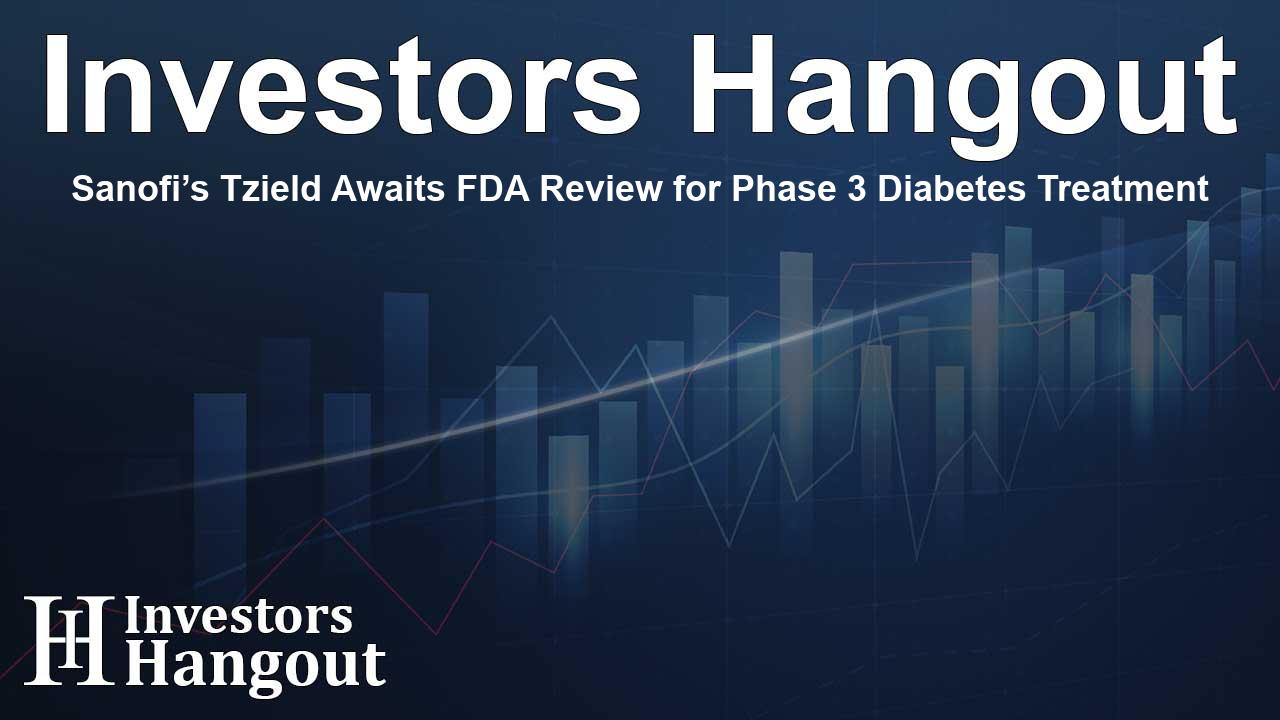Sanofi’s Tzield Awaits FDA Review for Phase 3 Diabetes Treatment

Sanofi’s Tzield: A Potential Breakthrough in Diabetes Therapy
Sanofi’s Tzield has taken a significant step as it is now under expedited review in the United States for the treatment of stage 3 type 1 diabetes (T1D). This review is being facilitated through the FDA Commissioner’s National Priority Voucher pilot program, which aims to accelerate the evaluation process for therapies addressing urgent medical needs.
Expediting the Review Process
The acceptance of Tzield's supplemental biologics license application (sBLA) could pave the way for its approval as the first-ever disease-modifying therapy for adults and children aged eight and older, recently diagnosed with stage 3 T1D. By using the Commissioner’s National Priority Voucher program, the FDA hopes to condense the review timeline from 10-12 months down to just 1-2 months, ensuring that patients receive vital therapies faster while upholding high safety and efficacy standards.
Key Features of Tzield
Tzield (teplizumab-mzwv) has been recognized for its innovative profile that could potentially prevent the progression of T1D, addressing a significant unmet medical need. According to Olivier Charmeil, Executive Vice President of General Medicines at Sanofi: "This is a recognition of the breakthrough innovative profile of Tzield... crucial in an area with limited treatment advances over the century."
Clinical Study Results
The sBLA is backed by robust results from the PROTECT phase 3 study, which demonstrated effectiveness in preserving beta-cell function by significantly slowing the decline of mean C-peptide levels post-meal, compared to placebo. This study involved approximately 1,000 participants and affirmed Tzield’s effectiveness in managing the disease.
Reported adverse events during the PROTECT trial were in line with those from earlier studies, including headaches and gastrointestinal symptoms. It was noted that 1.8% of participants developed cytokine release syndrome, a possible side effect linked to Tzield.
Alternative Routes of Approval
Beyond the expedited review, Tzield is also being assessed under the accelerated approval pathway. This avenue allows therapies to be approved based on preliminary evidence of efficacy, giving hope to patients in dire need of effective treatment options. A confirmatory study known as the BETA-PRESERVE phase 3 trial is already underway and actively enrolling participants, illustrating Sanofi's commitment to robust clinical validation.
Global Regulatory Status
Tzield has already received approvals across several countries, including the US, UK, and various regions in the Middle East, to delay the onset of stage 3 T1D in designated age groups. It has been acknowledged by the FDA as a Breakthrough Therapy and holds orphan drug status, reiterating its importance in treating rare diseases affecting limited populations.
Understanding Autoimmune T1D
In the context of autoimmune T1D, the progression is classified into four stages. Stage 1 involves the autoimmune attack without symptoms, while Stage 2 sees abnormal blood sugar levels emerge. It is only in Stage 3 where the clinical symptoms of diabetes are evident, necessitating insulin therapy for effective management. In Stage 4, chronic complications arise with little to no remaining beta-cell function.
About Sanofi
Sanofi is a research-driven biopharmaceutical company that aims to significantly improve patient outcomes globally. Its innovation-driven approach focuses on leveraging its deep understanding of the immune system to develop transformative medicines. With a commitment to addressing critical healthcare challenges and improving the quality of life for individuals worldwide, Sanofi tirelessly works towards enhancing treatment options for patients.
For inquiries, please contact the media relations team:
Sandrine Guendoul | +33 6 25 09 14 25 | sandrine.guendoul@sanofi.com
Evan Berland | +1 215 432 0234 | evan.berland@sanofi.com
Frequently Asked Questions
What is Tzield?
Tzield (teplizumab-mzwv) is a therapeutic monoclonal antibody aimed at delaying the progression of stage 3 type 1 diabetes in patients recently diagnosed.
How does the expedited review process work?
The expedited review process aims to accelerate the evaluation timeline for critical therapies while ensuring rigorous safety and efficacy standards are maintained.
What were the results of the PROTECT study?
The PROTECT study confirmed that Tzield effectively preserved beta cell function, helping to slow the decline of insulin-producing cells in participants with stage 3 T1D.
Is Tzield available globally?
Yes, Tzield has received approval in several countries, including the US and UK, and is under review in other markets.
What is the significance of receiving Breakthrough Therapy designation?
This designation highlights a therapy's potential to address significant unmet medical needs, facilitating faster development and review to bring innovations to patients sooner.
About The Author
Contact Dominic Sanders privately here. Or send an email with ATTN: Dominic Sanders as the subject to contact@investorshangout.com.
About Investors Hangout
Investors Hangout is a leading online stock forum for financial discussion and learning, offering a wide range of free tools and resources. It draws in traders of all levels, who exchange market knowledge, investigate trading tactics, and keep an eye on industry developments in real time. Featuring financial articles, stock message boards, quotes, charts, company profiles, and live news updates. Through cooperative learning and a wealth of informational resources, it helps users from novices creating their first portfolios to experts honing their techniques. Join Investors Hangout today: https://investorshangout.com/
The content of this article is based on factual, publicly available information and does not represent legal, financial, or investment advice. Investors Hangout does not offer financial advice, and the author is not a licensed financial advisor. Consult a qualified advisor before making any financial or investment decisions based on this article. This article should not be considered advice to purchase, sell, or hold any securities or other investments. If any of the material provided here is inaccurate, please contact us for corrections.
